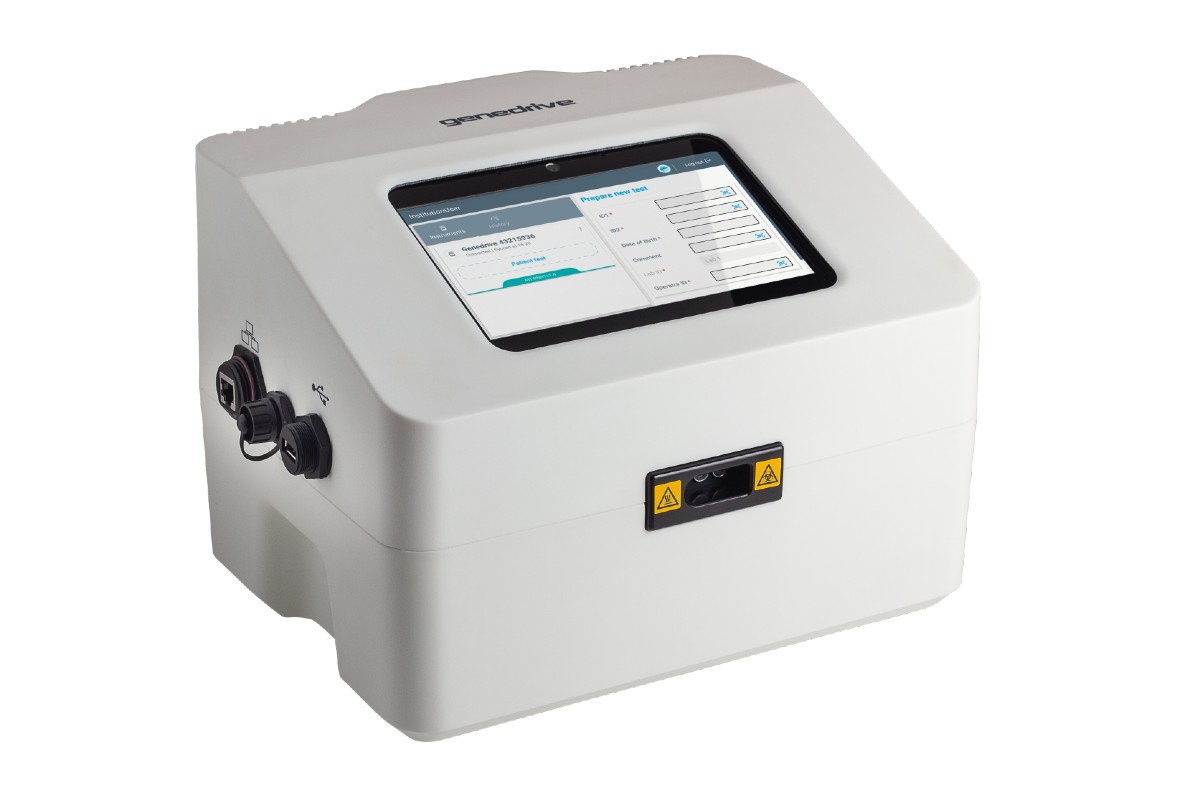This website uses cookies so that we can provide you with the best user experience possible. Cookie information is stored in your browser and performs functions such as recognising you when you return to our website and helping our team to understand which sections of the website you find most interesting and useful.
12 Sep 2023
Lifesaving bedside stroke test receives UK product safety mark

A revolutionary ward-based genetic test which can prevent stroke-related death has received a UKCA product mark, paving the way for its introduction to the NHS.
Developed by Manchester-based company genedrive and working with a clinical team from Manchester University NHS Foundation Trust (MFT) and The University of Manchester, the test can quickly tell healthcare professionals if stroke patients will benefit from the current first line treatment, to prevent recurrence.
Dr John McDermott, Clinical Geneticist at MFT and National Institute for Health and Care Research (NIHR) Fellow from The University of Manchester said:
“This work began with a grant from the Wellcome Trust four years ago, which supported the development of a prototype system with Genedrive. A major challenge faced across healthcare is finding pathways to develop, validate, and ultimately implement novel technology like this in the clinical setting.
In April 2023, we were awarded £4.1million in funding from Innovate UK to launch the DEVOTE programme, which is coordinated by Health Innovation Manchester and provides a framework for us to do this across Greater Manchester.”
DEVOTE represents a collaboration between industry, universities, and healthcare professionals to support the development and validation of time critical genomic testing technology, building on Greater Manchester’s world leading reputation in this area.
The DEVOTE programme is being delivered as part of the Health Innovation Accelerator which was announced earlier this year. The Health Innovation Accelerator will focus on enhanced diagnostics and genomics, delivered through a partnership between Health Innovation Manchester, Manchester University NHS Foundation Trust, and the University of Manchester.
Strokes affect more than 6,000 people in Greater Manchester each year and individuals carrying changes in a gene called CYP2C19 are twice as likely to have further strokes when treated with the first line preventative treatment, clopidogrel.
Patients being treated for mini strokes, TIAs, heart attacks, and peripheral vascular disease could also benefit from the technology, the Manchester clinical team says.
The genetic changes- which occur in about 25% of all patients in the UK (and up to 50% in different ethnic groups) reduce the effectiveness of clopidogrel – given as standard for most patients with stroke or TIA in the UK.
If these genetic changes can be detected before treatment, then doctors can use an alternative, more effective medicine. This would prevent further strokes, avoiding hospital admissions, saving lives, and reducing costs for the health service.
The technology this week formally receives the UK Conformity Assessed (UKCA) mark, the UK’s equivalent of the European CE mark after a process taking several years of development and validation.
Recent draft guidance from the National Institute for Health and Care Excellence (NICE) recommended that patients who have had a stroke or TIA should be offered genetic testing for variants in a gene called CYP2C19.
Current genetic testing for CYP2C19 can only be carried out using expensive machines in specialist laboratories a process which can take several weeks.
However, the Genedrive® System uses a miniaturised technology for gene reading which can be performed locally in the ward or bedside, can be used with minimal training, and rapidly provides the clinician results in around an hour.
The test will be used at Manchester Royal Infirmary and the Manchester Centre for Genomic Medicine, Saint Mary’s Hospital, both part of MFT, over the next six months, to further evaluate performance in the clinical setting.
Joseph, 29, who lives in London, had genetic testing at the Manchester Centre for Genomic Medicine to determine if clopidogrel is the right treatment for him following a stroke. He said:
“After suffering a stroke, I’ve been left with a lot of uncertainty around the cause, as well as apprehension that it could happen again. Confirming my ability to metabolise clopidogrel effectively has given me comfort in my ongoing management and prevention by providing reassurance that the medication is helping limit the risk of a secondary stroke.
“I was grateful that my genetic test results came back within a week but receiving that reassurance within an hour would have undoubtedly improved my experience.
“I feel fortunate to have had the genetic test and I hope that all patients being considered for clopidogrel medication will have the opportunity going forward. Having a bedside test to check the drug is working properly will revolutionise stroke aftercare and patient experience.”




